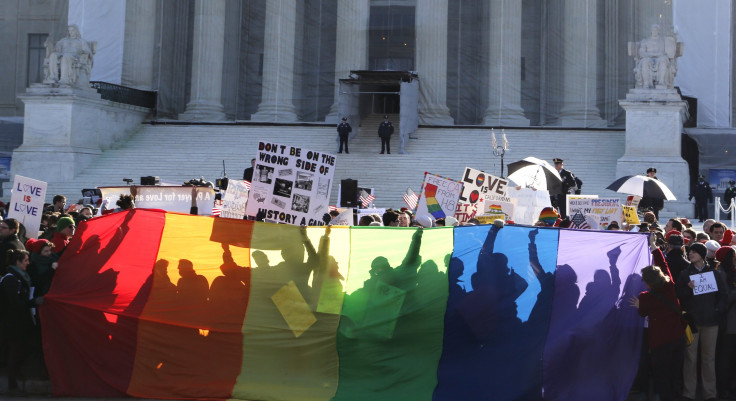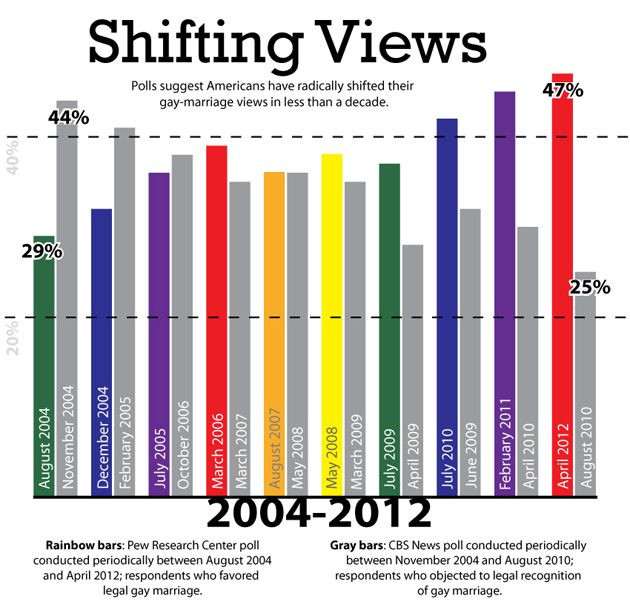Supreme Court Takes Up Gay Marriage: 5 Things To Watch


This week, the U.S. Supreme Court will hear two monumental cases that could change marriage law across the United States. The first hour of Tuesday’s back-to-back arguments will challenge California’s Proposition 8 – the 2008 ballot initiative that banned same-sex marriage in the state -- in Hollingsworth v. Perry. After that, the nation’s high court will take on the definition of marriage itself in United States v. Windsor, which challenges the constitutionality of the federal Defense of Marriage Act.
The DOMA case in particular is key because, under current law, more than 1,000 federal benefits that traditionally come with marriage -- governing such matters as hospital visitation and inheritance taxes -- are denied to gay and lesbian couples. The law is universally applied, even for same-sex couples who reside in states where their marriages are legally recognized.
But the risk to gay marriage is still substantial, even if DOMA is overturned. That’s because, even if they side with the plaintiff in DOMA, the justices could theoretically render discrimination – at least, in the case of marriage – constitutional if they do not strike down Proposition 8.
Here are some things to watch for in Tuesday’s arguments:
What Test Will Be Used To Determine Discrimination?
Laws that treat one class of citizens differently from another, as both DOMA and Proposition 8 do, can be struck down by the Supreme Court if it determines they have no "rational basis."
The justices could also consider if the law passes the test of “strict scrutiny,” the standard typically used in cases dealing with discrimination on the basis of race, ethnicity or religion, or “heightened scrutiny,” the standard in sex discrimination.
The difference? If the court goes with heightened scrutiny, the case could be used to defend gay and lesbian people from other issues typically associated with sex discrimination – for instance, it could make it easier for them to sue for employment discrimination or mistreatment. If they hold that anti-gay laws are subject to strict scrutiny, then it would mean all discriminatory laws against LGBT people must be treated with suspicion.
The Justices' Interpretation of the 14th Amendment
The Fourteenth Amendment of the Constitution says that “no state” may “deny to any person within its jurisdiction the equal protection of the laws.”
Obviously, that applies to all 50 states. Gay marriage supporters argue that denying marriage rights to gays and lesbians does not give them the “equal protection” reserved to heterosexual couples. If the court accepts that argument, it could decide that a state prohibition, as put into place by Proposition 8, is unconstitutional.
Where Will John Roberts Stand?
As he was the tie-breaking vote in last year’s Affordable Care Act decision, many are subsequently speculating that the conservative chief justice could once again side with the court’s liberal wing. Considering that a conservative argument against DOMA is particularly easy to make – after all, here’s a law that created and imposed its own definition of marriage on every state in the nation, arguably an abuse of federalism – Roberts could naturally side with the arguments against the federal marriage law.
What About Anthony Kennedy?
Kennedy has long been considered the court’s swing justice. He was also the two most important cases so far regarding gay rights – one where he said Colorado voters were constitutionally wrong to prevent cities and towns from passing ordinances protecting gays from discrimination (however, the court ultimately ruled the proposal did not pass strict scrutiny), and another that struck down Texas’ sodomy law. Clearly, with Kennedy, it’s about the argument, and not his personal opinion.
And Finally – Scalia Watch
It’s abundantly clear that Justice Antonin Scalia does not support gay marriage. After, just last year alone the justice said having “moral feelings” against same-sex marriage was comparable to being morally against murder, when a Princeton student asked him why he had previously compared the legality of gay marriage to both bestiality and murder.
Those aren’t the first anti-gay sentiments to come from Scalia, who also once said laws against homosexual sodomy were justified by centuries of law and tradition. In his dissent the Colorado case, he also wrote gay rights were favored by the “elite,” declaring that “This Court has no business imposing upon all Americans the resolution favored by the elite class.”
Just last month, Scalia made headlines against when he declared a provision of the 1965 Voting Rights Act is essentially “racial entitlement.” The odds suggest there will be more memorable statements from the justice this time around.
© Copyright IBTimes 2024. All rights reserved.





















